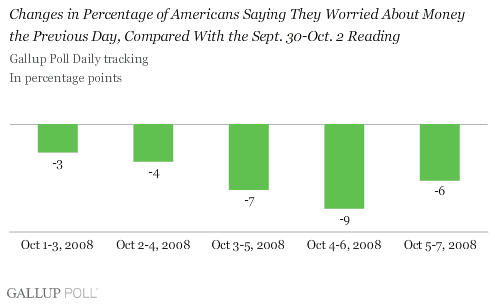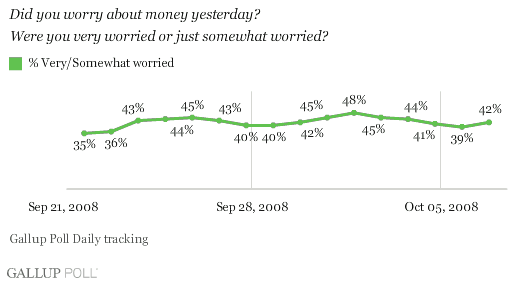PRINCETON, NJ -- Just prior to Congress' passing and the president's signing of the Treasury bailout legislation on Oct. 3, the percentage of Americans saying they worried about money the previous day hit a new high for the year at 48%. Since that time, worry has declined, with the percentage of Americans worried about money falling to 39% in Gallup Poll Daily tracking from Oct. 4-6 and 42% from Oct. 5-7.

Americans Less Worried About Money in Recent Days
Last Friday, Congress passed the historic Treasury bailout legislation with the goal of not only buttressing the U.S. financial system, but also calming Americans' fears about the safety of their money. That is, this legislation was supposed to have both a real impact -- the government's purchase of underwater financial securities -- and a psychological impact. The Treasury is still developing its purchase mechanisms and Wall Street continues to suffer as it evaluates the potential for a more severe recession than previously expected, but some of the positive psychological benefits of the legislation may already be taking place.
On Sept. 20-22, as the U.S. Treasury put forth its bailout proposal, 35% of Americans told Gallup they "[worried] about money yesterday." As previously noted, these concerns seem to have peaked at 48% in Sept. 30-Oct. 2 polling, just prior to the president's signing of this rescue legislation. Significantly, it appears that the new legislation may already be having a positive psychological impact, at least on the margin, as the percentage of Americans saying they are worried about money fell to 39% in Oct. 4-6 polling. While the percentage has increased slightly to 42% in the latest three-day tracking polling, it remains below its level before the legislation was passed.

Commentary
How the Treasury bailout is going to work and its real impact on the marketplace remain unclear, not only to Main Street but to Wall Street as well. Add in the recent chaos in the stock market resulting in enormous financial losses, and it may be hard to remember that another goal of this rescue legislation was to reassure the average American.
The collapse of numerous major U.S. financial institutions over the past few weeks has shaken consumers' confidence in the banking system and the U.S. economy. Gallup's polling shows that these events have not only increased consumer pessimism, but have also increased the financial worries of millions of Americans. In a very real sense, it is somewhat amazing that in late September/early October, nearly half of all Americans said they worried about money the previous day. The psychological impact of this kind of increase in worry not only on short-term consumer spending, but also on intermediate and longer-term consumer saving and spending behaviors could be quite pronounced.
Gallup polling over the past few days suggests that the mere passage of this historic rescue legislation has had some positive impact on consumer perceptions. Clearly, the U.S. government is signaling it will do whatever is necessary to stabilize the financial system. Even more importantly, this new legislation increased the Federal Deposit Insurance Corp.-insured deposit limits from $100,000 to $250,000. This could easily have reduced the worry of some Americans, particularly older savers and investors, about the safety of their money in their local banking institutions.
Still, the plunging Dow Jones Industrial Average, the losses reported on many 401(k) statements, and the chaos that both of these reflect could undo -- at least to some degree -- the psychological benefits of the new rescue legislation. This may be why Gallup's daily monitoring of consumer worries showed a slight uptick Tuesday night. On the other hand, the global interest-rate cut earlier Wednesday is another sign that governments and monetary authorities around the world are doing everything possible to strengthen today's fragile global financial system.
While Gallup's findings are very early at this point, it seems as if passage of the bailout legislation, including the increased FDIC limits, has initially had a positive psychological effect on U.S. consumers.
Survey Methods
Gallup is interviewing no fewer than 1,000 U.S. adults nationwide each day during 2008. The economic questions analyzed in this report are asked of a random half-sample of respondents each day. The results reported here are based on combined data for rolling three-day periods of approximately 1,500 interviews beginning with Sept. 20, 2008, to Oct. 7, 2008. For results based on this sample, the maximum margin of sampling error is ±3 percentage points.
Interviews are conducted with respondents on land-line telephones (for respondents with a land-line telephone) and cellular phones (for respondents who are cell-phone only).
In addition to sampling error, question wording and practical difficulties in conducting surveys can introduce error or bias into the findings of public opinion polls.
